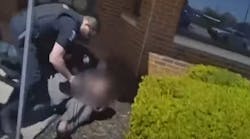Vikram Jaryal was working at the AM/PM convenience store in east Yakima early on April 6, 2017, when two people wearing masks came in and robbed him at gunpoint.
One of the suspects shot Jaryal for "no apparent reason," according to a summary of the case from the Yakima Police Department. Jaryal, 25, was able to tell police a few details about the robbery before he was taken to a local hospital, where he died a short time later.
Police released images from footage that captured those they believe responsible for the robbery and fatal shooting. The case is on the YPD's interactive online "Murder Map," which is available to the public.
Investigators think this case, and other cold cases on the map, can be solved. But as homicides continue in Yakima, finding the time to get back into older cases is challenging.
That's where retired law enforcement officers and a retired Yakima County judge are helping by contributing their time and expertise as part of a cold case group at the police department.
The group is working with Yakima police Detective Kevin Cays, a major crimes unit detective who last summer began focusing solely on cold case homicides. Cold cases are investigations in which possible leads have been exhausted and no new evidence is immediately anticipated or available.
Retired detectives Dave Johnson, Mike Blankenbaker and Tom Dittmar, along with retired judge David Elofson, are taking a closer look at cold cases. Major crimes unit Detective Drew Shaw and major crimes unit supervisor Sgt. Noah Johnson are also involved as necessary.
The focus is already making a difference. "We've got a number of cases where we have submitted new evidence," Cays said.
Dozens of cases
Yakima police have approximately 70 cold cases going back to the mid-1970s, Cays said. "There's probably more; we don't have a reliable list prior to then," he added.
The cold case volunteers come to the department every Wednesday. "Some of the guys come in on other days to work on little things," he said. "Right now we're just looking at a handful of cases, reviewing things," such as witnesses that may need to be re-interviewed, Cays said.
"We're going to be looking at evidence in a case from the 1970s later today," he added.
In taking another look at cold cases, the volunteers consider any and all possibilities for getting a case going again. Fresh eyes could yield new insights. They track down names, addresses and other information and consider the age of potential witnesses, persons of interest or others with knowledge related to cases. The ages of those people may add urgency to particular cold cases.
"We put our focus toward some of the older cases," Cays said. "If there's a case from 1980 that could be solved today, but not in five years" because witnesses may die in that time, it gets attention.
The volunteers' work is "a great help," he said. "I can't look at all 70 cold cases and know everything about them."
Now is an ideal time to reexamine cold cases. DNA and related technology has advanced, with genetic genealogy an added option. There is more lab space in Washington and more scientists dedicated to cold cases. Countless television shows and podcasts featuring law enforcement, investigations and solved and unsolved cases have caught the public's attention, with social media bringing all of that and more to an even bigger audience.
Such public sharing of cases through various media could jog someone's memory and lead to answers — and suspects.
Last August, the YPD began sharing videos about cold cases on its social media platforms. The most recent video, posted on Sunday, is the first of two videos seeking information in the Dec. 7, 2013, homicide of Jerene Matta. The 62-year-old was found deceased in her home at 1809 Greenway St. after firefighters responded to a blaze. Police later revealed Matta had suffered blunt trauma to her head before the fire and that her body was in a part of the house that did not burn.
"Ms. Matta was vocal about crime in her neighborhood and was known to contact the police on a frequent basis," Shaw says in the video, which is the first of two about Matta's homicide. "As you will see in next month's episode, this investigation had a lot of moving parts and garnered a significant amount of media attention at the time."
Shaw has led that investigation. He also wrote a synopsis her case for the Murder Map, along with the other cases, and the city's computer staff put it on the interactive map.
"I want to solve all the cases that were assigned to me. ... There's a couple that I can't let go, emotionally," Shaw said.
It's difficult for detectives because "there's no time to go back" and study cold cases in-depth, said Shaw, who described his role with the group as an assistant or an adviser to Cays.
"It's nice to have a group and be able to go back and run with something," Shaw said.
Important expertise
The group came together in a few ways. Lt. Chad Janis hoped to use volunteers to help investigate cold cases and met with Blankenbaker, who had retired from the Yakima Police Department in 2011 after 31 years in law enforcement.
"Then I ran into (Dittmar) at Costco," Blankenbaker said. "In talking ... we found some people interested."
The other volunteers followed after that. Yakima police Officer Dulce Diaz, who coordinates the department's Volunteers in Police Service program, got everyone through the process to be signed on as volunteers.
Blankenbaker mentioned a cold case among others he hopes to solve. Mordeice "Mo" Adams was shot to death outside a house party in Yakima on the evening of Feb. 19, 2008. Adams struggled outside with three men who came to the party before he was shot once in the chest.
"We need help. We need witness help," he said of Adams' homicide, which was highlighted in a cold case video in December. "I believe that there's people who saw it happen, know who did it."
It's also important to show families that authorities are pursuing cold cases, Dittmar said.
Dittmar was born and raised in Yakima and served in the U.S. Marines before joining the Los Angeles Police Department. He retired from the Seattle Police Department in 2000 after 21 years there and also moved back to Yakima that year.
"The victims' families are part of this too. It's a closure thing to know that the police department hasn't forgotten their loved one," he said.
"The support from these families is really overwhelming," Cays added. "The families are thankful. Like (Dittmar) said, them seeing that we actually care about their loved one; we've looked at it; we've reached out to them."
Johnson retired as a detective with the Yakima County Sheriff's Office in 2016 after a combined 43 years of full- and part-time service with Harrah and the county. After retiring from the sheriff's office, he worked as a captain for the Toppenish Police Department for a few years before leaving that role.
"When I was at the sheriff's office, we all had cases that cling to us over the years," Johnson said. He and Cays have gone to Spokane, Walla Walla and Kennewick for interviews related to cold cases, Cays said.
"Being a homicide detective is a different breed. You get that call at zero-dark-30 in the morning and you become part of their family because of the circumstances," he said. "You start the first case, then new cases come and the first case slips down."
As a retired judge, Elofson provides perspective he would have brought into a courtroom, such as how the court would likely rule on a topic.
"He provides some guidance for us; gives us a little legal help," Blankenbaker said.
Along with reexamining cold cases, Cays also hopes to expand the group's work into studying cold case sexual assault kits. State officials announced last fall that they had cleared its backlog of sexual assault testing kits, and going through those could yield suspects who were never charged.
There's also clerical work that needs to be done, such as entering older cases into the department's data systems. "There's a lot of that kind of work that needs to be done," Cays said.
But for now, "there's enough cases for us to all work full-time," Blankenbaker said. So the volunteers do what they can; they are retired, after all.
"We're all still trying to figure out how to weave it into our lives," Elofson said.
___
(c)2024 Yakima Herald-Republic (Yakima, Wash.)
Visit Yakima Herald-Republic (Yakima, Wash.) at www.yakima-herald.com
Distributed by Tribune Content Agency, LLC.



